For betta owners, there’s nothing more exciting than watching their fish spawn. All the processes from building a nest to laying eggs are just unique and interesting. And the best part is when you see your betta fish eggs hatch and cute fry swimming around in the tank.
However, achieving a good rate of success is not that simple. Even seasoned aquarists need extra effort to make sure they can get a good amount of fry. With the fact betta fish sometimes eat their eggs, you’ll want to pay extra attention to the young.
Are you new to betta keeping? Knowing all about betta eggs can be a good beginning. It may include but is not limited to size, appearance, and hatching time. It’s also important to know how many female betta fish typically lay eggs for each breeding season.
Luckily, we’ve provided you with an informative guide on things you should know as a betta fish keeper. Let’s begin with identifying betta eggs from their appearance.
Betta Fish Eggs Appearance
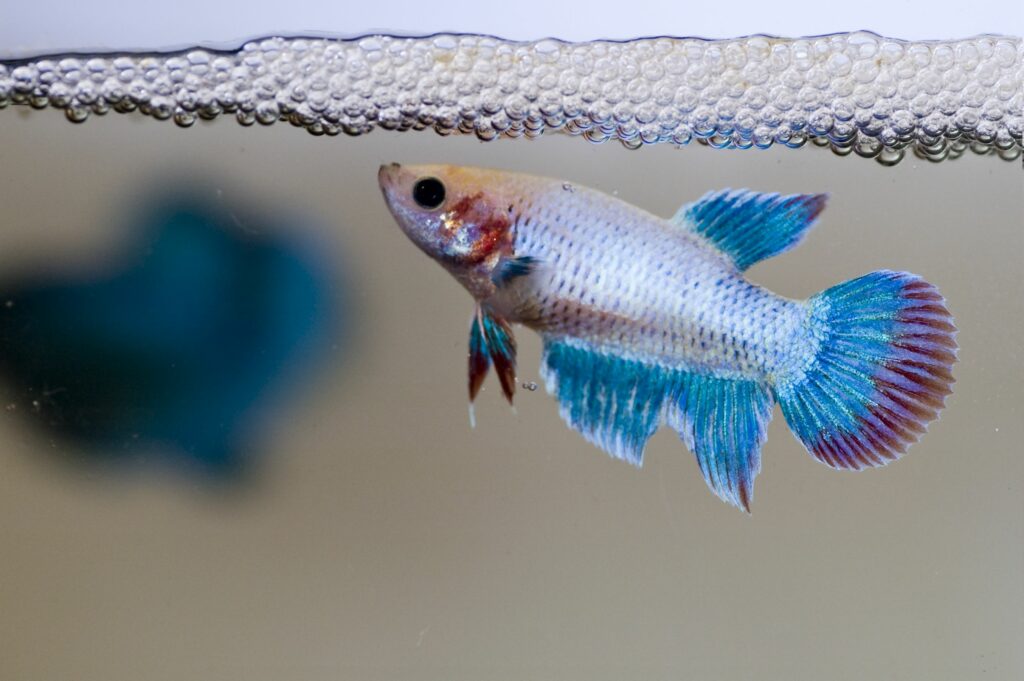
When you are keeping betta fish, chances are you’ll find a bubble nest floating on the surface of the water. These bubbles are actually betta nests where mature fish lay eggs. Identifying betta eggs in their nest can be a bit of a task.
Betta fish eggs can be described as a small, white ball measuring about 1 mm in diameter. Though betta fish eggs look like a ball, these bubble nesters’ eggs aren’t entirely round. Most eggs are oval but they have a non-uniform shape.
On the other hand, mouthbrooder betta fish have bigger eggs. Measuring between 2-3 mm, their eggs take quite some time to hatch. Mouthbrooding means the male fish hold eggs in their mouth for 7 to 10 days before releasing the fry. The eggs will be swallowed a little to make them more yellow.
How Long Does It Take for Betta Fish Eggs to Hatch?

Hatching time heavily depends on betta fish egg size. Bubble nesters which have smaller eggs take about 2 or 3 days to hatch. Meanwhile, mouthbrooder bettas which have bigger eggs take up a longer period before hatching up to a month.
Tiny fry begins to eat the first time they hatch. However, they’ll be eating from the yolk sack naturally attached to their bellies. They also depend on their parents for primary care. It commonly takes another 2 or 3 days before they start swimming and wandering in the tank without their parents.
It’s worth noting that betta fish eggs hatching time also depends on several factors as follows:
1. Species
Different species of betta fish (also known as siamese fighting fish) may have different hatching times. For example, bubble-nested bettas hatch faster than mouthbrooding bettas. Other species like macrostoma may take more than a month to hatch and be independent.
2. Temperature
Temperature affects the hatching time of betta fish eggs. Warmer temperature causes faster metabolism and digestion in betta fish, as well as faster hatching time. In warmer water temperatures between 79 – 82-degree Fahrenheit, betta eggs can hatch only within 24 hours.
That said, you shouldn’t breed bettas at these temperatures. They don’t like warm environments and they tend to die in such conditions.
3. Water Quality
Water quality plays a key role in maintaining a good hatch rate for bettas. Leaving your betta eggs in a tank with poor water quality will lead to egg damage. In extreme cases, it may kill all the eggs so you don’t have a chance to watch cute fry.
The reason is quite simple. Bacteria, parasites, and harmful substances are more likely to be present in poor water quality. These may affect the condition of your betta eggs and result in hatch failure. On the contrary, betta eggs have a higher chance to hatch in clean water.
How Many Eggs Do Betta Fish Lay?
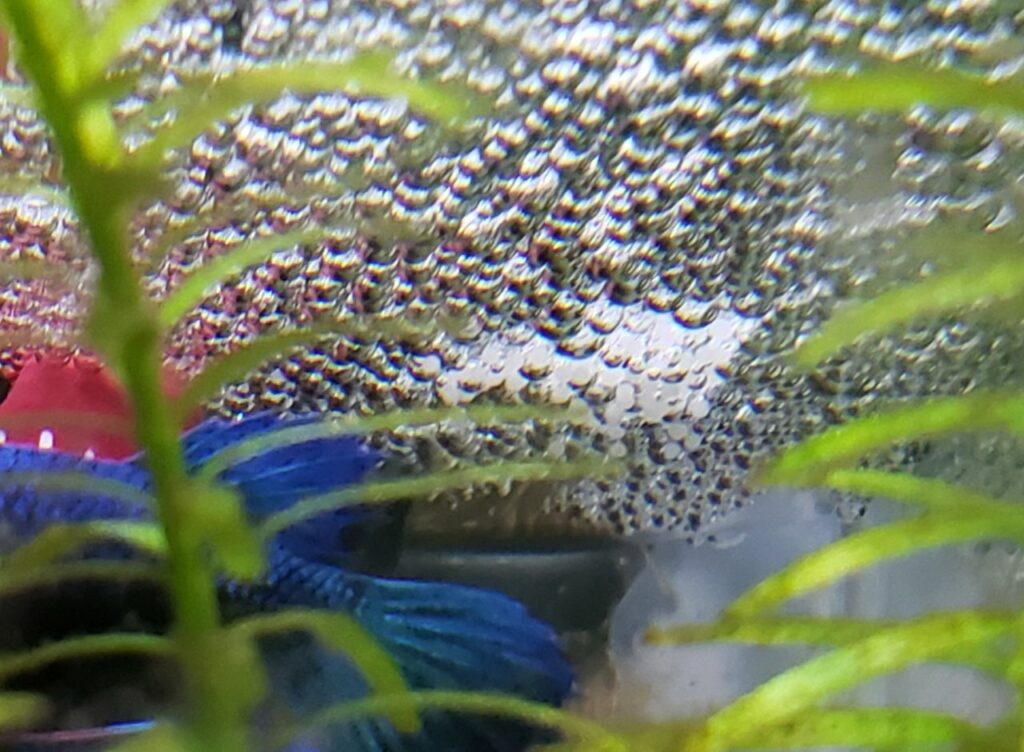
In case you didn’t know, betta fish do lay eggs. In general, adult bettas can produce up to 100 eggs per batch. But some female bettas can lay over 500 eggs in a batch, increasing the probability of having fry in the aquarium. On the other hand, their mouth-brooding counterparts only lay between 10 and 20 eggs per batch.
Several factors may affect how many eggs a female betta can lay:
1. Age
Age does affect the number of eggs an adult betta can lay. It typically takes 2 to 3 months for bettas to be sexually mature. But it is highly recommended not to breed them at a younger age. For high-quality eggs, you will want to wait for 6 to 8 months before spawning them.
Female bettas stay fertile for their entire life. However, they will become less fertile as they age. When they are 2 to 3 years old, they will produce fewer eggs.
2. Size
The number of betta fish eggs is also influenced by the size of the females. Ideally, betta keepers should wait until their female bettas are fully grown and reach the size of the males. At this size, they will be able to handle the males and lay healthy eggs.
3. Experience
The more experienced your female bettas, they will more likely to lay more eggs. Females that have been spawned many times know how it goes so they can handle all the process. The chance is getting higher when both males and females are experienced in spawning.
4. Conditioning
Conditioning your bettas help increase the number of eggs and the success rate. That becomes the question, how to condition your betta fish? It can be many ways.
For example, feed your fish high protein food many times a day. Whether you opt for live or frozen, it helps increase the chance of laying healthy eggs. Showing off your fish to each other also encourages egg production.
Having a large number of betta fish may be exciting but there’s a catch. Not all of the eggs will hatch into healthy fry. Besides, the males also eat some of the eggs to make sure they can give enough care to the remaining fry.
How Often Do Female Bettas Lay Eggs?
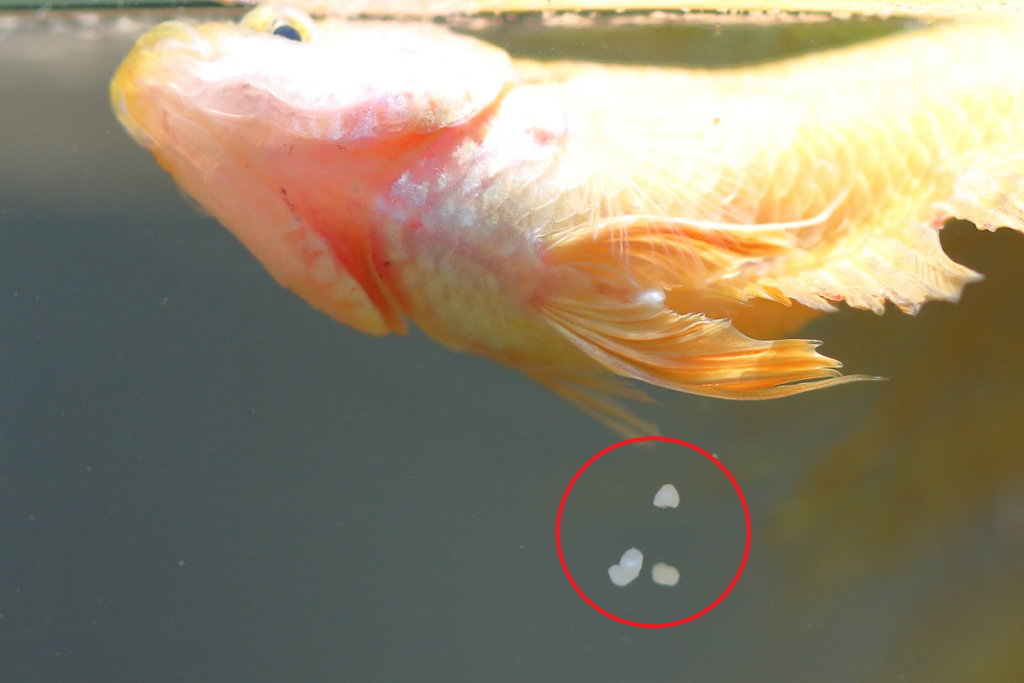
It’s good to know that betta fish are naturally productive. Depending on the environment and health condition, female bettas can lay eggs every week. That means you can expect hundreds of young bettas every month.
However, a stressed betta may take longer to lay eggs. If you want the aquarium to be filled with cute betta fry, you’ll need to make sure the adult bettas are in their best condition. Make sure male bettas are experienced and strong as well.
How to Say If Female Bettas Are Ready to Mate?

Several signs tell you if a female betta is ready to mate. Change in skin color is the easiest to identify. When a female fish is ready, its skin color turns slightly darker. You may also spot a barring pattern on the skin—these patterns only develop when female bettas are ready to mate.
Beside her mid area, you will find a vertical stripe that indicates fertility. Another sign you shouldn’t skip is the egg hole that opens more often. What to do next?
If your betta shows these signs, place a pair of male and female bettas in a tank. The male will build bubble nests and the female will spawn. To mimic their natural habitat, add some leaves to the surface of the water.
Where Do Bettas Lay Eggs?
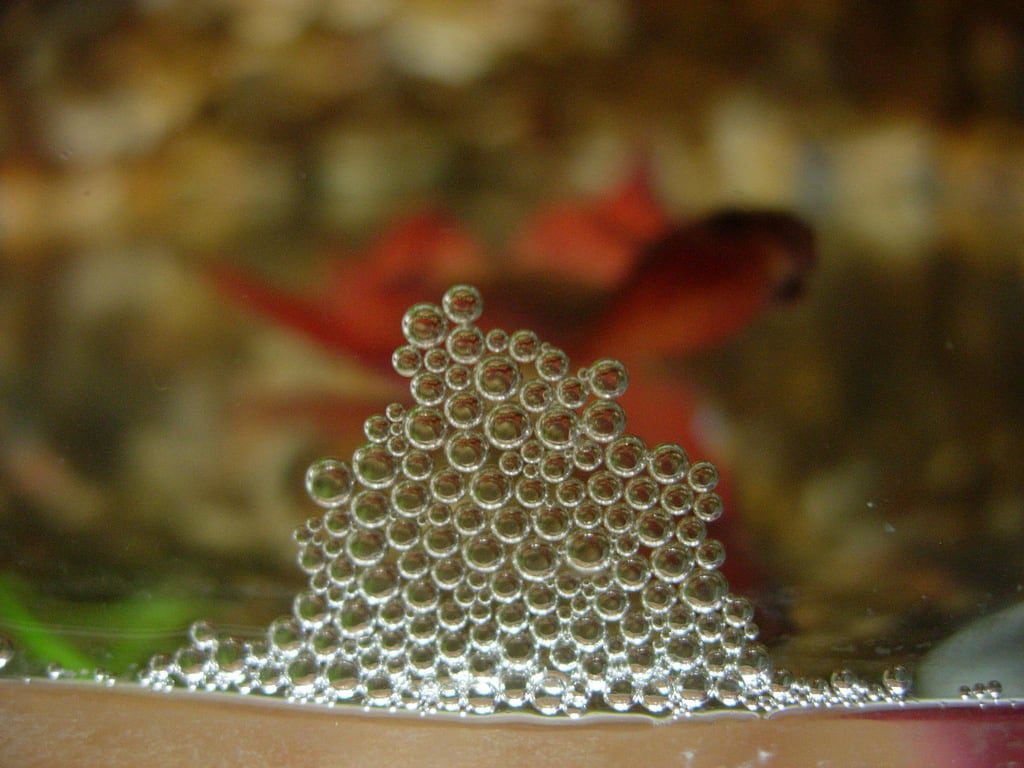
Bubble-nesting bettas spawn in their bubble nest. Male bettas build bubble nests that serve as a safe place for their eggs and fry. When a male and female start spawning, the male will bring the eggs into the nest and take care of them until they hatch.
With betta fish egg size that’s relatively small, the males don’t need to build a large nest. In the wild, bettas build their nests to protect the eggs and fry from predators, not to mention it helps provide them with enough oxygen supply.
Even in an aquarium tank, bettas still have the same behavior. They build nests using their breathing organs to blow air to the water surface. They’d love to build nests on water surfaces covered with leaves and plants for it gives extra protection from destruction.
Do Male Betta Fish Lay Eggs?

Quite similar to other species of animals, male betta fish doesn’t lay eggs. Only female bettas can lay eggs but the males can help with the process.
Female bettas naturally produce eggs without their mates but males make them hatch. Without male bettas, the eggs won’t have a chance to hatch and they will begin rotting over time. Rotted eggs lead to an ammonia increase in the water which can be toxic to your pet bettas.
Healthy female bettas will always have eggs. When they can’t find a mate, the eggs will be absorbed and recreated in the next batch.
How to Say If Your Bettas Lay Eggs
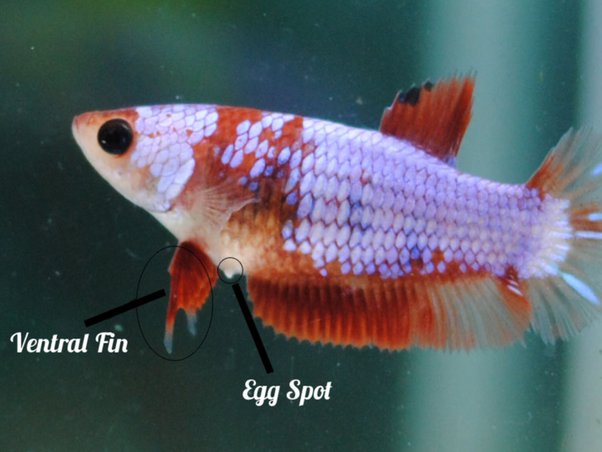
You might be wondering if your female bettas are laying eggs. While it’s quite difficult to identify small white round eggs floating on the water, all you have to do is find bubble nests. When it floats on the water surface, chances are that your bettas are close to spawning.
Once the male betta builds a nest, it will wait for the right female to mate with. After the female counterpart is found, they will mate and the female will place the eggs in the nest.
What to do after the fish spawn? If you’re sure enough that the fish has laid eggs, it’s time to remove the female and leave the male in the tank. Male bettas will help the eggs hatch. But be sure to transfer the male soon after it starts eating the fry.
How to Say If Betta Eggs Are Fertilized?
It’s quite common that new betta owners don’t know if their betta eggs are fertilized. There’s the only way to figure it out—find gray spots. Healthy eggs come out white but when they have been fertilized by the male, you will see growth signs with gray spots.
As time goes by, you will be able to spot small fish covered in a white yolk sack. That means betta fry is ready to hatch.
But it’s a bit tricky to do the same method to mouth-brooders. Since the eggs are placed in the male’s mouth, you will need to catch them before checking.
Can Betta Fish Eggs Hatch without Bubble Nest?

Bubble nests play a vital role in protecting the eggs and fry. Though the eggs can hatch without their nest, the rate may drop significantly. The fry may not be able to survive under this condition, mainly because of predators or lack of oxygen supply.
How Mouthbrooding Betta Eggs Hatch
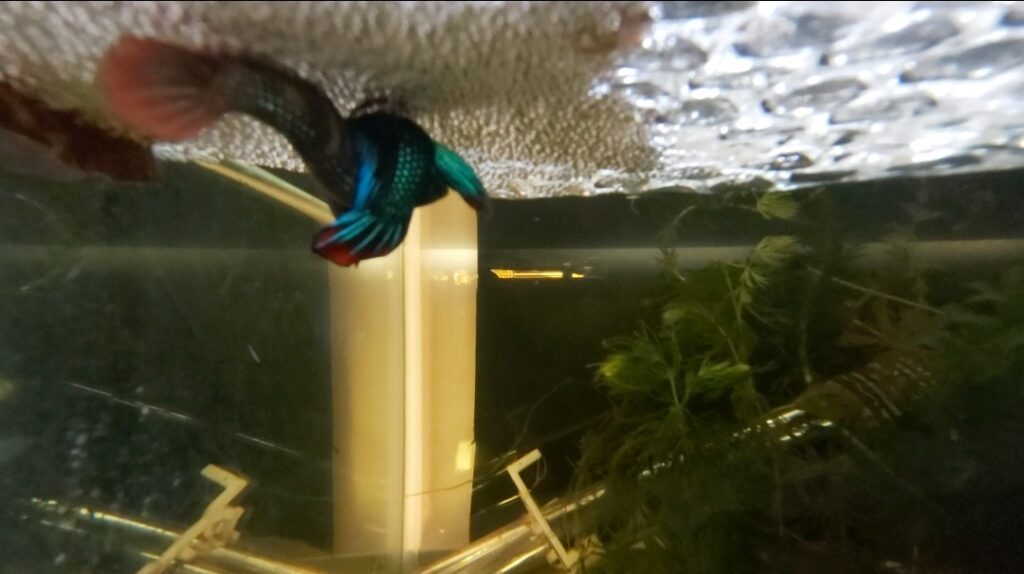
Mouthbrooders don’t build nests when they are ready to spawn. Bubble nests are only suitable for shallow pools with a lot of covers without current. Bettas living outside this environment have another method to hatch their eggs safely.
Mouthbrooding bettas live in Indonesia where they live in an environment with streams and currents and less cover on the surface. This type of betta holds the eggs in its mouth, protecting the eggs from predators and other threats.
The male mouthbrooders will keep their eggs and fry for multiple weeks. For this function, they are featured with larger mouths and jaws. Though mouth brooding has a lot of benefits like a more protected environment and better oxygen supply, it has several drawbacks.
For instance, the male bettas can’t eat while caring for their eggs and frying. They are also vulnerable to predators because they carry a burden in their mouths. With limited space available in the mouth, the males can only hold fewer eggs.
Final Thought
Watching your bettas spawning is very exciting but there are plenty of challenges waiting ahead. Without knowledge about betta fish eggs and a little know-how, chances are that you will achieve a low hatch rate.
Keeping the small white balls healthy until they hatch can be a bit daunting. Be sure to maintain water temperature, water quality, and oxygen supply to make your aquarium full of fry. Since they eat a few days after hatching, you may also need to provide ideal food for the babies.



